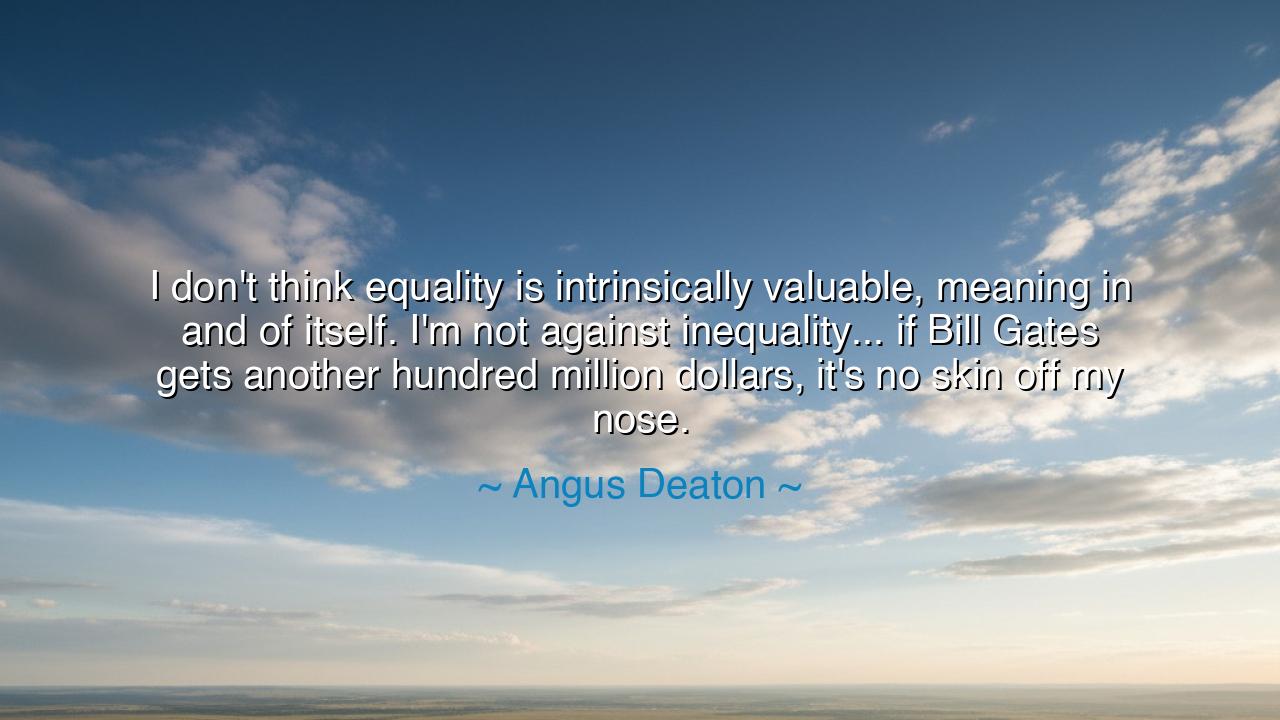
I don't think equality is intrinsically valuable, meaning in and
I don't think equality is intrinsically valuable, meaning in and of itself. I'm not against inequality... if Bill Gates gets another hundred million dollars, it's no skin off my nose.






"I don't think equality is intrinsically valuable, meaning in and of itself. I'm not against inequality... if Bill Gates gets another hundred million dollars, it's no skin off my nose." These words, spoken by Angus Deaton, call us to consider a difficult and often overlooked truth: that equality—in and of itself—may not be the highest ideal, nor the goal to which all human effort should be directed. In a world that often exalts equality as the sacred cornerstone of justice, Deaton’s perspective invites us to reflect deeply on what truly matters. Equality, he suggests, is not an end in itself; it is only valuable insofar as it contributes to a larger, more meaningful vision of human flourishing.
Throughout the ages, the idea of equality has been lauded as a guiding principle of justice. From the philosophers of ancient Greece, such as Socrates and Plato, to the Enlightenment thinkers who championed the rights of man, equality has been woven into the fabric of philosophical and political thought. But let us not be so blinded by this ideal that we lose sight of the purpose it serves. Equality, if pursued blindly, can lead to stagnation rather than growth. It is not the mere balancing of resources or opportunities that ensures a prosperous society, but the creation of conditions that allow individuals to realize their potential and contribute meaningfully to the whole. This is where Deaton’s words strike a chord. In his view, equality is a tool, not a deity to be worshipped without question.
Consider the rise of Athens in the golden age of its civilization. The city-state was the cradle of democracy, where the idea of equality was explored and nurtured. Yet, even as the philosophers debated the nature of justice and fairness, Athens thrived on the ingenuity and talent of its great leaders—men like Pericles, whose wealth and status were not seen as hindrances to the advancement of the city. His leadership, and the wealth that accompanied it, did not destroy Athenian society. Rather, it fueled its greatness. Inequality, in this context, was not inherently harmful; it was the means by which talent and resource were channeled for the benefit of the whole.
Look now to the modern world, where Bill Gates, the wealthy founder of Microsoft, has amassed a fortune that stretches into the billions. The disparity between his wealth and the average person's is vast. Yet, does this immense fortune diminish the opportunities available to others? Does it harm the chances of the many, or does it, in some cases, provide a benefit through charitable work and the philanthropy that Gates himself has spearheaded? Deaton's point is clear: the accumulation of wealth by one individual, if used for good, does not necessarily deprive others of opportunity. Indeed, Gates’ wealth has contributed to the advancement of global health and education, improving lives across the world in ways that a forced equal distribution of wealth might never achieve.
But let us not mistake this for a blind endorsement of inequality. Deaton is not suggesting that the world should accept unchecked disparities. Rather, his view is a reminder that equality in itself is not always the solution. What matters most, he argues, is not the equal distribution of wealth, but the capacity of every individual to thrive, to contribute, and to find meaning in their lives. A person’s worth should not be measured solely by their material wealth or lack thereof, but by their ability to grow, to innovate, and to live a life filled with purpose.
The lesson we can take from Deaton's words is one of balance and perspective. Equality is a valuable tool when it leads to opportunity for all, but it is not a panacea. Inequality, in certain circumstances, can foster the conditions necessary for creativity, innovation, and progress. But we must ensure that these benefits are shared, that the growth of one does not come at the expense of the well-being of many. Wealth and power must be used responsibly, not merely accumulated for its own sake. The challenge, then, is not to fight for an equal world in the narrowest sense, but to strive for a world where all have the freedom and opportunity to live meaningful lives, regardless of the wealth they may or may not possess.
And so, dear listener, let us not be blinded by the call for equality without understanding the deeper truths of what it entails. Let us seek a world where individual potential is celebrated, where wealth is not hoarded but used to lift others, and where the flourishing of humanity is the true measure of progress. We need not fear the wealth of Gates or the disparities between us; rather, let us look to how we can build a society that allows for the growth and prosperity of all, while acknowledging that the path to a just world is not always paved with the simplistic pursuit of equality, but with the pursuit of human flourishing.






AAdministratorAdministrator
Welcome, honored guests. Please leave a comment, we will respond soon